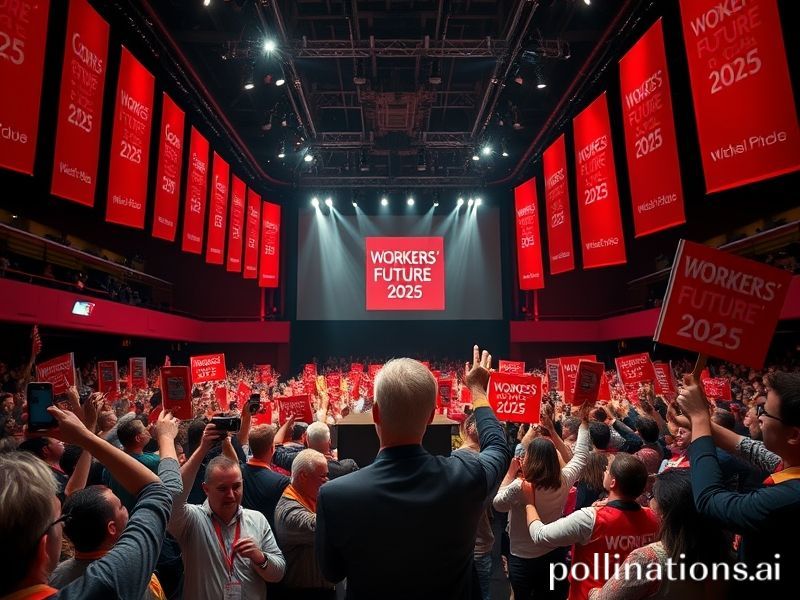Labour Conference 2025: Britain’s Attempt to Reboot Social Democracy While the World Snacks on Schadenfreude
Labour Conference 2025: The World Watches Britain Try to Remember What a Pay Rise Looks Like
By Our Man in the Cheap Seats, Geneva
Brighton, United Kingdom—The seagulls here have learned to time their dive-bomb raids for the exact moment a delegate bites into a £14 halloumi wrap, a skill that would be admirable if it weren’t so economically efficient. Inside the Brighton Centre, the 2025 Labour Party Conference is unfolding like a long-running prestige drama that forgot to renew half its cast: familiar faces, slightly more exhausted, delivering lines about “growth” and “renewal” while the rest of the planet wonders whether Britain is staging a political comeback or simply rehearsing for a heritage reboot nobody asked for.
Global audiences tune in for the same reason rubberneckers slow past motorway pile-ups—morbid curiosity blended with relief that it isn’t happening to them. For Washington, the conference is a low-stakes soap opera: President Ramirez, still busy explaining to Iowa why her semiconductor plan isn’t “just chips for billionaires,” can safely ignore Sir Keir Starmer’s latest pledge to “make Brexit work” without specifying which part of the anatomy Brexit currently resembles. Brussels, meanwhile, dispatches junior staffers to count how many times the word “re-join” is uttered, converts the tally into euros, and files it under “wishful thinking.” Tokyo’s Nikkei live-blog simply repeats the phrase “still not our problem” every 15 minutes; investors find the consistency soothing.
Yet beneath the parochial theatrics lurks a question with planetary resonance: what happens to the centre-left when the centre no longer holds and the left has been priced out of the property market? Delegates speak of “AI-ready jobs” and “green growth,” phrases that translate in the Global South to “robots elsewhere” and “green tariffs on our exports.” A Ghanaian trade minister, sipping lukewarm conference coffee that tastes of geopolitical realism, tells me her country now mines cobalt for British wind turbines and then buys the electricity back at a premium. “It’s like growing your own dinner and still having to tip the chef,” she says, deadpan.
The conference fringe is where the real stories ferment. I watch a panel titled “The Future of Work” devolve into a theological dispute over whether four-day weeks apply to gig couriers who already work zero-hour contracts in sixteen different apps. A delegate from Argentina live-tweets the session with the single repeated emoji 🤡. Meanwhile, a pop-up stall sells £35 T-shirts emblazoned “A Fair Day’s Pay,” stitched—irony not included—in a Bangladeshi factory whose workers earn that slogan monthly. When questioned, the vendor blames “complex supply chains,” which is late-capitalist for “someone else’s fault.”
Security is tighter than a ministerial apology: facial-recognition gates, airport-style scanners, and a polite notice banning “unauthorised sarcasm.” Outside, climate activists in lobster costumes (a Brighton tradition, apparently) demand reparations for coastal erosion and free chips. The juxtaposition is so perfectly British it could be subsidised by the Arts Council.
The international press corps swaps notes like war correspondents rationing cynicism. The German reporter files copy about “post-Brexit nostalgia as export commodity.” The French correspondent drafts a think-piece called “Can Social Democracy Survive Without Social Democrats?” The lone Chinese journalist has already ghost-written tomorrow’s Global Times editorial: “UK Labour Debates Prove Superiority of Centrally Planned Harmony.” We clink overpriced lager and agree that at least the bar accepts euros—small mercies in a country that still hasn’t decided which currency to regret leaving.
By Thursday night, the conference app crashes under the weight of 3,000 simultaneous searches for “nearest cashpoint that still works.” A junior shadow minister reassures me this is a metaphor for “agile economic policy.” I suggest it’s more like agile economic reality, but he’s already been reshuffled.
Closing day brings the ritual standing ovations and a composite motion on “Global Solidarity” that manages to mention every continent except Antarctica, presumably because penguins don’t vote. In the press pen, we place bets on how long before the next leadership crisis. The smart money says Christmas; the optimists push it to Budget Day.
As delegates scatter to trains that may or may not run, the world’s takeaway is predictably brutal: Britain is trying to renegotiate its future with the same energy it reserves for queue-jumping disputes—earnest, verbose, and ultimately stationary. Still, if Labour can sell that as progress, there’s hope for all of us. After all, the planet is still spinning, even if the pay isn’t rising.







